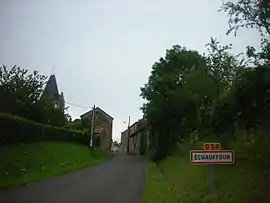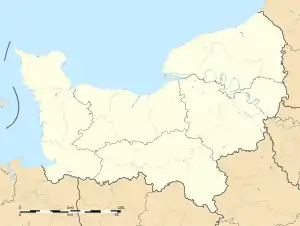Échauffour | |
|---|---|
 Village entrance | |
Location of Échauffour | |
 Échauffour  Échauffour | |
| Coordinates: 48°44′29″N 0°23′19″E / 48.7414°N 0.3886°E | |
| Country | France |
| Region | Normandy |
| Department | Orne |
| Arrondissement | Mortagne-au-Perche |
| Canton | Rai |
| Intercommunality | Vallées d'Auge et du Merlerault |
| Government | |
| • Mayor (2020–2026) | Didier Duvaldestin[1] |
| Area 1 | 33.14 km2 (12.80 sq mi) |
| Population | 734 |
| • Density | 22/km2 (57/sq mi) |
| Time zone | UTC+01:00 (CET) |
| • Summer (DST) | UTC+02:00 (CEST) |
| INSEE/Postal code | 61150 /61370 |
| Elevation | 223–331 m (732–1,086 ft) (avg. 281 m or 922 ft) |
| 1 French Land Register data, which excludes lakes, ponds, glaciers > 1 km2 (0.386 sq mi or 247 acres) and river estuaries. | |
Échauffour (French pronunciation: [eʃofuʁ] ⓘ) is a commune in the Orne department in north-western France.
Geography
The commune is on the borders of the country of Ouche and the campaign of Alençon. Its village is 4.5 km northwest of Sainte-Gauburge-Sainte-Colombe, 9 km north-east of Merlerault, 11 km south-east of Gacé and 20 km west of L'Aigle.
Covering 3,314 hectares, the territory of Échauffour is the largest in the canton of Merlerault.
Name
The name of the locality is attested in the forms Escalfo in 1050[3] [4] and Scalfou around 1053. The toponym would be linked to the presence of lime kilns: ès chaufours (former French: "in the lime kilns").[5][6] It can also be derived from the old French cracked ("split, burst") crazy ("beech").
The residents are called Échauffouriens.
Population
| Year | Pop. | ±% p.a. |
|---|---|---|
| 1968 | 1,005 | — |
| 1975 | 1,005 | +0.00% |
| 1982 | 836 | −2.60% |
| 1990 | 735 | −1.60% |
| 1999 | 764 | +0.43% |
| 2007 | 770 | +0.10% |
| 2012 | 737 | −0.87% |
| 2017 | 742 | +0.14% |
| Source: INSEE[7] | ||
Politics
The current Mayor is Luc Féret who replaced Claude Burin in 2008.
Places and monuments
- St. Andrew's Church.
- The castle built around the year 1000, by Helgon, after attribution of the estate by Richard II of Normandy and belonging to the Giroie family by marriage until the 14th century, is replaced in the 15th century by a fortified house. The house is remodeled and enlarged in the 18th century. The 18th century farmhouse was remodeled in the 19th century. 15th century chapel.
- At a place called Old town, the castle of the eighteenth where resided the Marquis de Sade. No plaque indicates this stay.
- The three menhirs of Crouttes classified as a Monument historique.[8] A dolmen is also present at Les Brossettes.
Churches St. Andrew (fifteenth century), former Benedictine priory, and St. Germain (fifteenth century). Both buildings house many works classified as objects to the Historical Monuments.
 Gare Échauffour.
Gare Échauffour. St Andrews church
St Andrews church
Sports
The Échauffour Sports Union has made a football team evolve into a district division until 2012.[9]
Personalities linked to the commune
In 1763, following a first scandal, the case Jeanne Testard, the Marquis de Sade is under house arrest for four months at the castle d'Échauffour, property of his father-in-law, Claude-René de Montreuil, president of the court of the aides of Paris. The Marquise de Sade, Renée-Pélagie de Montreuil, after her separation from the Marquis in 1790, resided in the castle with her daughter for most of the year until her death in 1810. One can still read their names engraved on the tombstone, in the small cemetery of the village.
- Paul Harel (1854 to Échauffour - 1927), poet, innkeeper and man of the press.
- Denise d'Échauffour, abbess of the abbey to the Ladies of Caen from 1141 to 1160.
- Marie-Thérèse Auffray (1912-1990 to Échauffour), artist and member of the French resistance during WWII.
See also
References
- ↑ "Répertoire national des élus: les maires". data.gouv.fr, Plateforme ouverte des données publiques françaises (in French). 9 August 2021.
- ↑ "Populations légales 2021". The National Institute of Statistics and Economic Studies. 28 December 2023.
- ↑ Albert Dauzat et Charles Rostaing, Dictionnaire étymologique des noms de lieux en France, Paris, Larousse, 1963.
- ↑ Ernest Nègre, Toponymie générale de la France, vol. 2 : Formations non romanes ; formations dialectales, Genève, 1998 (lire en ligne, p. 1236.
- ↑ René Lepelley, Dictionnaire étymologique des noms de communes de Normandie, Condé-sur-Noireau, Éd. Charles Corlet, 1996 (ISBN 2-905461-80-2), p. 113
- ↑ Albert Dauzat et Charles Rostaing, Dictionnaire étymologique des noms de lieux en France, Paris, Larousse, 1963.
- ↑ Population en historique depuis 1968, INSEE
- ↑ Base Mérimée: Trois menhirs dits les croûtes, Ministère français de la Culture. (in French)
- ↑ "LIGUE DE FOOTBALL DE NORMANDIE – Au cœur du Football Régional".